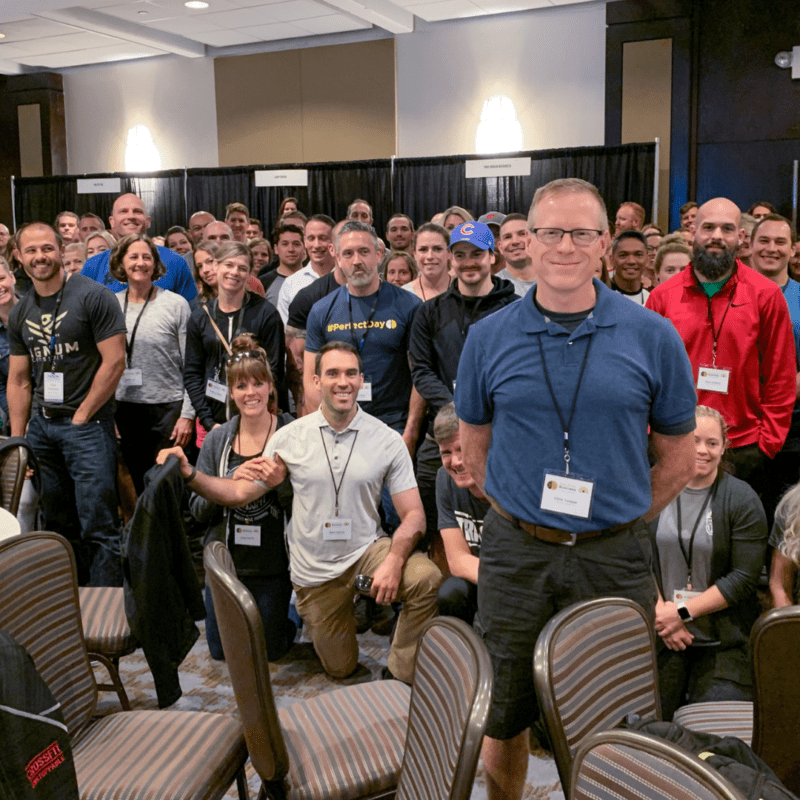When I was turning my gym around, my motto was “less, better.”
Outside the business world, this concept is called “virtuosity”—sticking to the basics, getting better and better, and avoiding distractions. In other words, it’s “doing the common uncommonly well,” to quote the gymnastics definition made famous by Greg Glassman, founder of CrossFit.
Virtuosity in Business is the theme of our annual summit on June 8 and 9 in Chicago, and we’re bringing some pro speakers to help you master the basics, stay focused and grow your gym without distractions.
The basics are that important.
Boring Basics for the Win
Virtuosity is one of the most difficult skills for entrepreneurs to practice because it’s hard to address the fundamentals for the tenth time. It’s way easier to try every new idea that comes along.
High-level performers in golf, for example, work on their basic swing for years, but novices buy new equipment all the time. This is true in most sports.
A gym example: An owner should work to master selling their program before attempting to “flood their gym” with marketing. But the siren song of “leads, leads, leads!” is strong enough to distract most of them. So they sign up with a marketing agency, get 30 people in the door, don’t close them—or don’t retain them—and wind up back where they started.
Likewise, a gym owner should focus on developing staff to make them all “eight-out-of-10 coaches” instead of employing a few “threes” and one “nine.” This requires evaluations and feedback—a basic but uncomfortable process many gym owners forget or ignore.
Another one: Entrepreneurs in any service business should develop the skill of asking for referrals and nurturing leads before they jump into paid marketing delivered to a cold audience—but most lack the discipline to master the basics because the lure of novelty is so strong.
One of the challenges of mastering the basics is that it gets boring. Who wants to do another sales role-playing exercise when they could shoot an Instagram reel or record a podcast? It’s tempting to be the first to try—and talk about—a new idea, be an early adopter or tell your friends how to do the new thing. This is the “curse of the novice.”
In a letter to coaches around the world, Glassman wrote, “There is a compelling tendency among novices developing any skill or art … to quickly move past the fundamentals and on to more elaborate, more sophisticated movements, skills or techniques. This compulsion is the novice’s curse—the rush to originality and risk.”
He goes on to describe the novice’s curse as “excessive adornment, silly creativity, weak fundamentals and, ultimately, a marked lack of virtuosity and delayed mastery.”
Mastering the Essentials
What are some of the basics every entrepreneur should master?
- Reading a profit-and-loss statement (P&L).
- Getting client referrals.
- Building three or four marketing funnels and tracking the metrics every month.
- Ensuring consistent delivery of service by staff.
- Selling their product.
- Performing regular staff evaluations.
- Creating content.
Here’s the critical part: Most entrepreneurs can grow their businesses faster by improving the fundamentals than by adding new strategies or tactics.
For example, every entrepreneur should know how to read a P&L. Even basic familiarity will help an entrepreneur understand how the business is doing.
But the pursuit of mastery—asking questions of the bookkeeper, thinking about classifications, identifying opportunities and putting in lots of reps—will grow the business faster than skimming the P&L and then searching for new trends on social media. The P&L should create focus for a business owner, which is the first step to growth.
As another example, a business owner who can improve close rate by 10 percent will grow the business faster than an owner who increases ad spend. Performing better with every lead will multiply the value of all future advertising, but most entrepreneurs pass on sales mastery to take the easy path of throwing more money into lead generation.
Of course, we can’t ignore the fun, new stuff. Innovation and creative thinking are important. But novelty must always be balanced with the pursuit of virtuosity in the fundamentals. Mastering the basics is more important than learning something new.
To succeed in business, master the basics yourself and systemize them for your staff. If you do, you’ll optimize outcomes over time.

